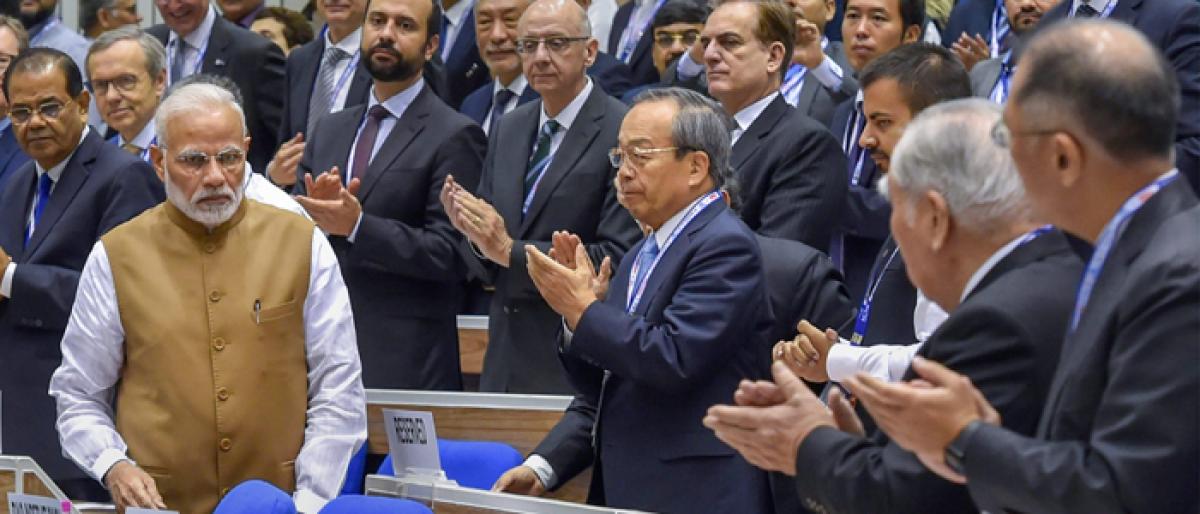Live
- Are strict laws needed to ensure MLAs attend Assembly sessions?
- Gold rates in Vijayawada today surges, check the rates on 22 November, 2024
- Gold rates in Visakhapatnam today surges, check the rates on 22 November, 2024
- Satya Kumar flays YSRCP govt for ruining new med colleges
- AP High Court to hear RGVs anticipatory bail plea in social media remarks case
- ICC Champions Trophy: PCB appoints Chief Operating Officer; reiterates stand to host Champions Trophy entirely in Pakistan
- Probe initiated after food poisoning incident
- BGT 2024-25: Nitish Kumar Reddy, Harshit Rana make India Test debuts in first Border-Gavaskar Trophy in Perth
- 100 students fall sick after consuming contaminated food
- TCS will commence ops in Visakha in 3 months: Lokesh
Just In

The 22 dialogue that just concluded between India and the US is a major breakthrough, both militarywise and in foreign policy The way the two countries manoeuvred around the pitfalls shows abundant maturity A certain amount of mutual respect has gone into it and the needs of each nation and its philosophies respected This could come as a blow to the critics who are ever ready to attack the Ce
The 2+2 dialogue that just concluded between India and the US is a major breakthrough, both military-wise and in foreign policy. The way the two countries manoeuvred around the pitfalls shows abundant maturity. A certain amount of mutual respect has gone into it and the needs of each nation and its philosophies respected. This could come as a blow to the critics who are ever ready to attack the Centre over everything keeping aside national interests. India has held its ground very clear without giving any room for ambiguity.
Strategy-wise, it is a wiser move as an ambivalent stand with the US or any attempt to please it at the cost of our friendship with Iran or Russia would have proved us grossly wrong in the long run. Whatever may be the ground realities, India, at least, should not cast away its long-term friends for short-term gains.
That is what this 2+2 is all about. Yet, another significant achievement is the agreement reached upon to hold a massive tri-service military war games involving their armies, navies, air forces and marines as a consequence of agreements reached at Thursday’s historic inaugural 2+2 meeting. It should be noted that India does not hold similar military exercises with any other country.
For record sake, the 2+2 dialogue was held between Indian foreign and defence ministers Sushma Swaraj and Nirmala Sitharaman and US foreign and defence secretaries Mike Pompeo and James Mattis (these two braved a vilification campaign back home of being moles in the Trump administration during the testing times here in India). The joint exercises have acquired greater complexity and newer dimensions, both bilaterally and in wider formats.
As Nirmala Sitharaman rightly pointed out this would enhance our synergies in this area. The exercise is expected to be carried out in the Eastern Coast of India in 2019. The two countries also referred to terrorist attacks on Indian military bases — Pathankot and Uri, for example — and asked Pakistan to crack down on terrorism in its territory. The fact that both the countries have jointly denounced any use of terrorist proxies in the region, and in this context, have called on Pakistan to ensure that the territory under its control is not used to launch terrorist attacks on other countries goes to prove that the fight against terror has been taken to a new level.
On the eve of the 10-year anniversary of the 26/11 Mumbai attack, they called on Pakistan to bring to justice expeditiously the perpetrators of the Mumbai, Pathankot, Uri, and other cross-border terrorist attacks. The icing on the cake was that the decision for the tri-service war games was reached along with the signing of the Communications Compatibility and Secrecy Agreement (COMCASA). Both agreed to cross-post military officers between the US naval central command (NAVCENT) and, possibly, the Indian naval western command. It is a win-win agreement for both as the US too has moved forward in its resolve to draw India into its fold in taking on China in the busiest maritime route of the world. Kudos to team Narendra Modi!

© 2024 Hyderabad Media House Limited/The Hans India. All rights reserved. Powered by hocalwire.com







